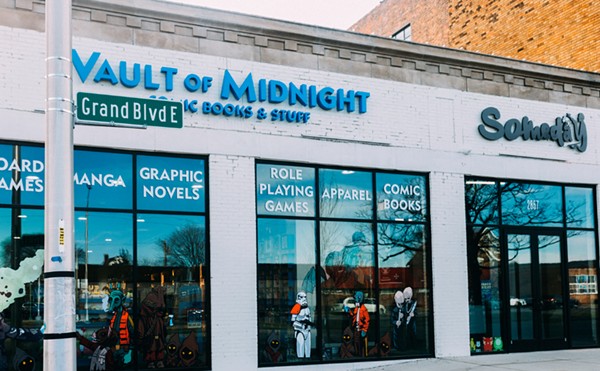Few things are more pleasing than watching Newt Gingrich eat crow. Alas, Washington will soon bid him goodbye and he'll be chowing down in the privacy of his bunker deep in the smug, antiseptic bosom of suburban Atlanta, from whence he came.
Newt's tumble into the pit of hubris coincides with the rerelease of The Big Chill (1983), a film rife with insights into why the Republicans blew it. Was it Voltaire who said that every revolution is betrayed by a counterrevolution? And that logic cuts both ways. Hippies became yuppies. The yuppies bought into the Contract on America, but then realized that if Newt and his Christian Coalition pals had their way, less government meant legislated bedtime, prayer meetings and impromptu raids on suburban boudoirs. The slogan of small "c" conservatism clearly reads, "It's the economy and tolerance, stupid."
The genius of The Big Chill, if it can be called that, is its sympathetic semantics of perspective. Seven friends convene to bury a fellow former radical who has committed suicide. But instead of looking into the coffin, they look into their own navels. Compromise, Lawrence Kasdan and the cast tell us, is not selling out. Let guilt be your guide. The dead friend, who tried to maintain the fever pitch of revolution, was the loser because he didn't realize that if you can't beat 'em, join 'em. After venturing out to the margins, you inevitably will be pulled back to the center.
Lest we forget, the '60s turmoil, by and large, was courtesy of middle-class kiddies from the first post-World War II suburbs. The working-class folks were either in Vietnam or brooding into their lunch buckets. They didn't really have the luxury of illusion. And black America, producers of the Motown sound that Kasdan ladles out throughout the film, gave us the civil rights movement which was hijacked, for better or worse, by the Summer of Love.
The Big Chill, then, is a film about coming to terms with the luxury of protest; how to live with the residue of your earnest convictions of youth while you punch the clock for the legal tender.
But the suburbs and their yuppie denizens make such an easy target in the '90s because we oscillate between two poles. On the one hand, we love irony and its implicit critique of what has come before. The playful kitsch and camp of John Waters' (Female Trouble and Polyester) takes on suburban life seem quaint, however, compared to the current spate of joyless excursions into the American rec-room. Waters liked to stick it to the straights, sure, but he possessed a screwy whimsy that helped the medicine go down.
The Ice Storm (1997), with its adult key parties and adolescent gropings, gives us a bleak picture of how the '60s made it to the suburbs in the '70s and tore through June Cleaver's girdle. The old bullshit just didn't cut it anymore.
The Truman Show, Pleasantville and especially Happiness all establish an emotional flatness that distances the viewer from the dubious actions of the characters. Dad's a pedophile? Of course he is. Life's a TV show? Why not? In these films, the surface tranquillity of the suburbs seems a transparent sham and aren't we clever for being able see them for what they are -- evil incubators of bad vibes and bad times. That invitation to smugness is a large part of the films' appeal and plays right into our age of victimhood.
Gen-X kiddies, in particular, gravitate toward introspective "out of the nest" films that front the nihilistic sophistry that the ghetto is not the only place without a future. Yet, this audience fails to recognize how short and how fast is the time between a Mohawk and a mini-van. It might be cool to laugh at mom and dad's hippie nonsense, but just you wait until your own kids hold their nose to Kurt and Alanis.
If we look back in anger, we also look back in anguish. We crave the golden age of the suburbs. Flea markets are packed on Sundays with soccer moms cruising for Bakelite tableware. The surest way for a greasy spoon to get a lineup on Saturday mornings is to give the cook a pair of librarian glasses and play Patsy Cline on the sound system. Norman Rockwell is still a highly popular painter, much more so than Eric Fischl and his downbeat tableaux of suburban angst.
I should say "white suburban angst." Even though it was black voters, both inner-city and suburban, who turned the tide of last week's election, we get very few films that deal with how black America moved out of the '60s to the suburbs. Where's their Secaucus Seven, their Decline of the American Empire? Films about basketball and homestyling adventures in guns and bitches can't be giving us the picture, can they? Sadly, cats like Spike Lee, middle class all the way, don't see any percentage in that. Street cred is the name of the game and if you ain't got game, you don't get paid. Pity, because it's always nice to know how the people of a revolution find their way into evolution.





